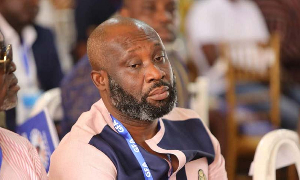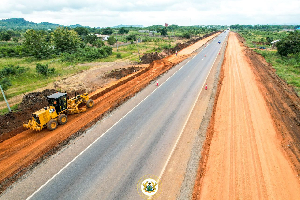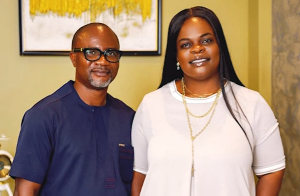The dreadful angst over our 2004 political elections is over but the need for effective governance looms real and supreme. As a ?disasporan?, inordinately obsessed with the prospect, if not tussle, of returning home, I will not hide the size of my itch by scratching visibly, a few flakes of gross disappointment with what has happened to Ghana?s economic development. The culpability I carry, for leaving the pristine shores of Ghana when the economic and political hell fire reached foundry proportions, still permeates my sober reflections. Sometimes, I fight this remorse by ringing the bell of reason, expressed in this wise old usage that he who fights and run away, live to fight another day. So maybe, just maybe, I wasn?t nebbish to the situation after all. At least, I can palliate, if not placate, my regretful soul, now that I have a fighting chance to actively engage the root causes of our problems and at the same time assuage it debilitating effects.
Politics in Ghana, like blues music, invokes all kinds but particularly some of the worst passions in all of us. Ours has never been mainly about altruism or asceticism. Instead, through the lens of ideology, tribalism, greed, and corruption, we have nurtured a thriving culture of hate and industrial strength enmity, while we figure out what politics is all about. Though few raisins of political maturity lace the cake of our emerging political culture, there is little reason to be overly optimistic at this moment. Our political story is quaintly shaped by a litany of senseless coups and bitter political rivalry. The latter is usually expressed in ideological terms by a slim intellectually stiff minority. The net effect is that, the majority of our people, unfortunately stolid in political demeanor, has and continues to suffer. Hoodwinked by puffed up political gimmickry, lack of continuity, abandoned projects, neglected countryside, misguided foreign loans, and vile corruption, our people, with gritty comportment, continue to labor on with yet the slimmest of hopes, that someday and somehow, their heaven on earth may indeed arrive gracefully. Certainly not to be delivered by political prelates or elite, but through their own hard earned engagement.
One obvious victim of our convulsed political climate is national development. While self-centered tirades about national development fill every stanza of windy political stump speech and economic ditty, this wholesale deception appears not to have seared the public mind enough, to invoke a well-calibrated cataclysmic debate that will end up with clearly defined steps aimed at economic development. I am talking about an economic master plan that is originally brewed in the hot sun of Africa. An original systemic plan, that emanates from the real needs of the people who inhabit every nook and cranny of our motherland. I am of the view that we can either drink ourselves silly, crying copiously into our beer and palm wine or master enough intellectual courage to serve up our own ideas. We must not be afraid and even if met with failure in our efforts to put out fresh ideas, we should wear such with a badge of enduring honor. Let our epaulets from failed efforts represent the beacon of hope and restive courage.
I am about to make a spicy proposal but before I do that, let me bring some context to my case. Nkrumah was in the midst of his seven year plan when he was violently overthrown by his political enemies. As a result of hatred for him and what he stood for, almost every relic of his was either destroyed or banned. As if that is not enough, projects funded with hard earned money from the cocoa farmers and the newly minted working class were abandoned. Ships loaded with goods already paid for, were returned and the men and women assisting in building our infrastructure were either brutalized or repatriated. Folks, I am making the case here that it is one thing to dislike an ideology but awfully senseless to destroy and waste public property in the name of a phony revolution or democracy. Some of the imported property in question continue to litter the landscape as we speak. Can anyone convince us that we could not have salvaged anything out of Nkrumah?s efforts? As did many, I also make the point that, the latter issue of salvaging public property does not necessarily assume that Nkrumah was wrong. Certainly, not for the sincere and genuine efforts that Nkrumah put forth. I know this to be the case given all the attempts by Kufour?s government to resuscitate some of these old and abandoned factories. Never mind the clever pilfering of his ideas! If we can salvage some of Nkrumah?s efforts now, why didn?t we do it then? Can we begin to fathom the progress we would have made if the wenchi tomato factory had operated for some 38 even years? What about Pwalugu and the Ashanti shoe factory? The least that could have been done by the discredited National Liberation Council was to find creative ways to continue from where Nkrumah left off. The general point here is to highlight the enormous cost of discontinuity to the poor taxpayer and general wellbeing of the country. This story point represents the typical situation in Ghana of a takeover or civilian change in government.
Follow the above trajectory into the post-Nkrumah era and the story is the same. The common theme is that projects go as governments do. The poor taxpayer is not often, but always, left holding the bag. However, if the taxpayer gleefully and predictably says nothing or does not react angrily, who is to say that this cyclical madness must stop? There are times when my ready-to-burst puffed up worry for the people of Ghana, cannot be expressed in words. For far too long, we have been too forgiving and totally irresponsible. We, not anybody else, have the God given right to effect the kind of changes that we desperately need. Our failure to do so, leads to bad governance and we suffer terribly in the end. A jutted example is the lack of leadership that has led to a massive flight of doctors from the country? Do you think that, systemically, this is not a byproduct of our arrested development? All our problems are intricately linked and the earlier we attack the root causes, at the same time massaging its effect, the better off we will be.
In the light of all the above, I am of the opinion that we should carefully expunge our national development from politics. I know that to the ideologically starched and political hacks, this may be a preposterous recommendation. However, we can either opt for depoliticize development in the interest of the people for a change or continue this African roulette of deceptive national development. Take you pick! When we have intricately politicized our national development, what we get in return is ethnic favoritism, misapplication of resources, corruption, bloated promises, lack of accountability, disengagement from politics, discontinued projects, ideological donnybrooks and a disjointed economic development effort. Put starkly, our people suffer religiously. If we depoliticize national development, not only will we do away with all the stubborn warts and scars that I have listed above, but stand to have a coherent economic development program, the goals of which, politicians cannot and must not be allowed to mess with.
First, we, using nonpartisan bureaucrats or civil servants, must work from the village up, a viable economic plan. The needs of villages must/will be rolled into district plans, that of districts into regional plans and regions into national plans. We will and can only develop one community at a time. At all these stages, a team of experts, working inseparably with the local folks, identify needs as the locals see it and then apply cost benefit analysis to these projects. These projects will be prioritized based on local input. What we end up with at the national level, is a citizen generated development need list. At this stage, our economic planners will be asked to put the total list into an economic master plan. The next stage of this effort is to weigh these needs, now morphed into viable projects, against local resources not necessarily limited to any region. Once the master plan is complete, local conferences will be held to finally walk through the plan, after which, the plan, with clearly defined milestones and evaluative mechanism, goes into effect. This plan will or must have the force of law and a defined shelf life. Ten years is what comes to mind.
The goal here is not to have development goals that are politically motivated but rather, need based. What we need are enduring developmental goals devoid of pyrrhic ideological m?l?es, and put in place by the people who till and live the land. Politics will therefore be limited to the enforcement of this plan initiated by the people. Even in event of a coup, God forbid, these military misfits cannot use ideology or any of their puerile shenanigans as excuse to overthrow the real apolitical wishes of the people as expressed in this development plan. Given the milestones that chalks this master plan, it becomes quite easy to measure objectively, what the politician have done during their tenure. Also, this will ensure that the national cake is evenly distributed and slated projects are being undertaken based on local priorities. Another telling benefit will be the targeting of foreign loans to specific priorities. If and when the IMF and the World Bank comes prying, for they will, the government can safely tell them that they (the government) are not in a position to obviate the wishes of the people. This then should put the government in very strong stead to bargain based on immutable needs of the people as endorsed by them. Furthermore, the most lethal form of political puffery, expressed in the form of empty and inoperable campaign promises, will not only be unnecessary but a waste of time. Politics, as a result of this process will be limited to IMPLEMENTATION. Is that not what we sorely need? In the end, we will have all our energies focused on a homegrown development plan that reflect the realities of villages and urban areas. The political decibel level and hot flashes is likely to come down in such environment.
Folks, we are not going to develop along the lines of the west necessarily. We don?t have anyone to colonize or enslave. There is no easy way to build or generate capital in this highly competitive global village. This means that we have to be creative. If there is one thing that we all agree on, despite ideological differences, it has to be our national development. If we can agree on the goals and take politics out of it, we stand a strong chance of staying focused and relentlessly pursuing our dream. If there is any luxury we cannot afford, it is the deceptive politics of national development. The stakes are way too high. It is high time that we the people shed the role of the proverbial African claque and embrace boldly, our role to determine a destiny we can call our own. The latter will not happen by chance. We have to fix the place we call home. This means that, we need to souse ourselves in groundbreaking creativity and courage that defy the east and west frontier. Instead of the much touted but overly empty ?golden age?, we ought to be leaping all over the place with the ?age of originality and creativity.? We must defy the kind of leadership that maintains the status quo and kills our ability to say, what if? Just what if, my brothers and sisters? Just watch the entrenched elite fight this idea too. Our development can only be constricted by our lack of imagination.
Nii Lantey Okunka Bannerman
The Gale
When the unruly gales of Africa unfurls, may it lift the wishes of its real people to the fore.May it sculpt their dreams into tangible showcases, leaving with it a glow that shames darkness. May it cause the people enough anguish, angering their soft hearts to purposeful hardness. May it awaken their slumbering conscience, prodding their suppressed energies with one goal paramount, claim your destiny or live somebody?s nightmare. Let the people?s doughty action be now and wise.
A change so fundamental, ohh how I wish!
--- Poem originally composed by Nii Lantey Okunka Bannerman















